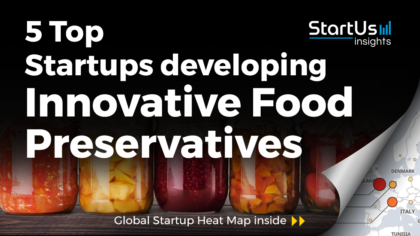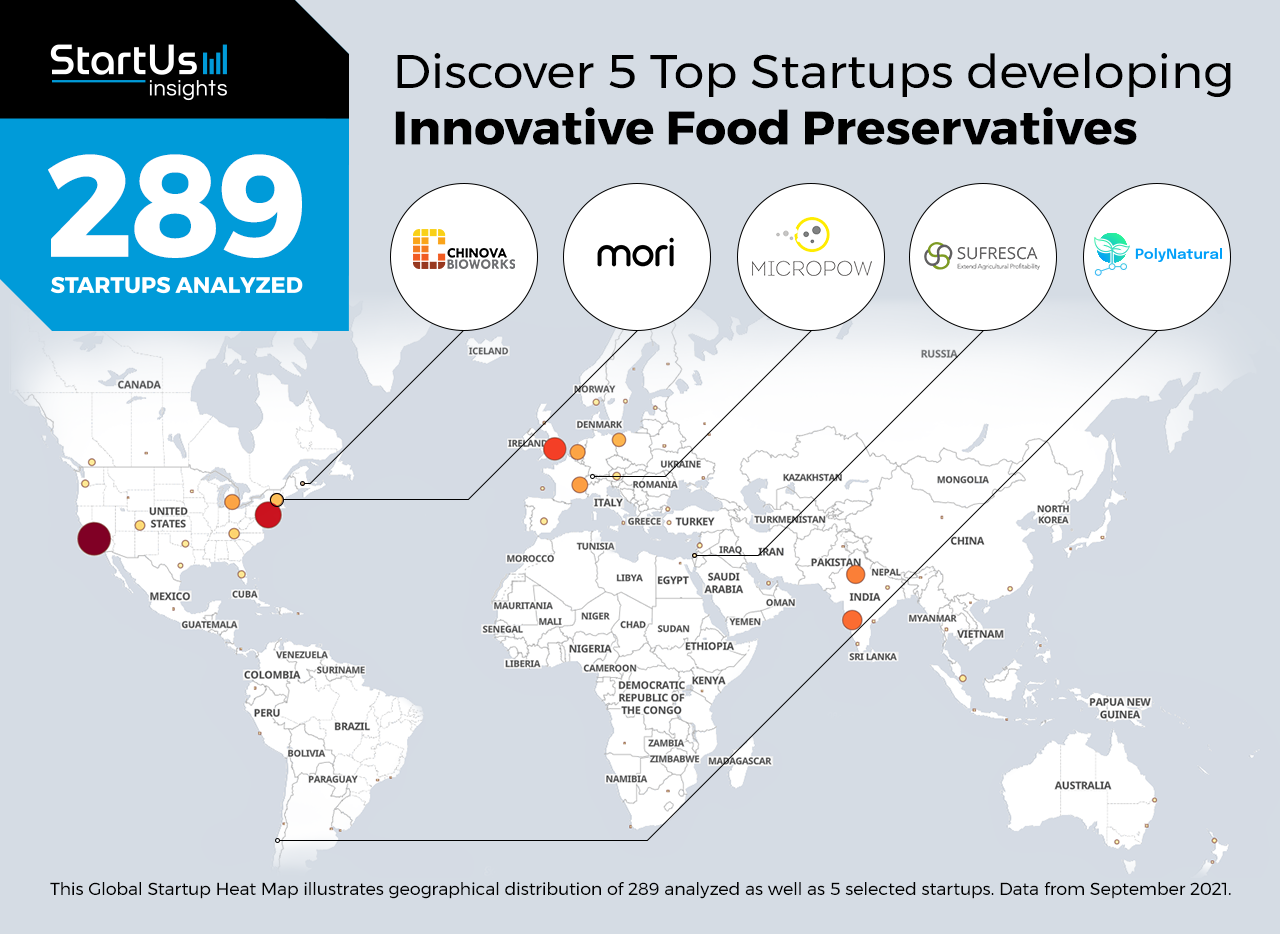Staying ahead of the technology curve means strengthening your competitive advantage. That is why we give you data-driven innovation insights into the food industry. This time, you get to discover 5 hand-picked startups developing innovative food preservatives.
Out of 289, the Global Startup Heat Map highlights 5 Top Startups developing Innovative Food Preservatives
The insights of this data-driven analysis are derived from the Big Data & Artificial Intelligence-powered StartUs Insights Discovery Platform, covering 2 093 000+ startups & scaleups globally. The platform gives you an exhaustive overview of emerging technologies & relevant startups within a specific field in just a few clicks.
The Global Startup Heat Map below reveals the distribution of the 289 exemplary startups & scaleups we analyzed for this research. Further, it highlights 5 startups that we hand-picked based on criteria such as founding year, location, funding raised, and more. You get to explore the solutions of these 5 startups & scaleups in this report. For insights on the other 284 innovative food preservatives solutions, get in touch.
Sufresca develops Bio-Based Edible Coatings
Nearly half of the food produced on farms is wasted until the time it reaches households. Bio-based food coatings are gaining attention as a solution to preserve agri-food products for a longer time. Startups use natural ingredients to develop edible coatings that form a protective layer but remain undetectable to our senses. This allows all the stakeholders in the food value chain to obtain higher monetary benefits by reducing wastage.
Israeli startup Sufresca offers bio-based edible coatings for agricultural products. It extends shelf life and reduces the loss of fresh produce under changing conditions while keeping them fresh. Besides, the protective coating acts selectively to only treat openings or injured areas on the surface of arils and berries, for example. It further prevents anaerobic fermentation and generation of off-flavors over time. This allows farmers and retailers to derive the maximum value of production.
Chinova Bioworks produces Mushroom-based Preservatives
Companies typically use chemical preservatives to extend the shelf life of a product. However, a continuous intake of artificial preservatives negatively impacts consumer health. Natural preservatives, on the other hand, are not as effective in delaying the product’s expiry. Hence, startups are researching novel natural compounds that considerably increase the life of food products and are safe for consumption.
Canadian startup Chinova Bioworks develops natural preservatives from mushroom extracts. The startup’s product, Chiber, consists of fibers extracted from the stems of white button mushrooms. The fibers allow products to stay fresh longer and inhibit bacterial growth, thereby improving the consistency and quality of the product over its shelf-life. It finds use in the production of fruits, beverages, sauces, and plant-based dairy items.
Mori advances Protein-based Food Preservation
Fruits and vegetables naturally have a limited life span of few days and a large fraction of them are wasted along supply chains too. Plastic packaging fixes this problem but harms the environment and impacts consumer health. Therefore, food startups develop preservation technologies inspired by nature. The emerging companies utilize naturally produced preservatives like silk to advance food protection, which also reduces carbon footprint.
US-based startup Mori develops a protein-based food protection technology. The startup uses the protein present in silk cocoons to create an invisible protective layer around fruits. This prevents dehydration, oxidation, and microbial growth, which keeps food items fresher for longer and preserves them naturally along the supply chain. Mori also makes food more sustainable by eliminating single-use plastics.
MicroPow offers Natural Flavor Encapsulation
Beyond extending the shelf life of the products, some food preservatives retain the flavors of the food products. Ready to cook and instant mix food products, for example, contain ingredients that increase the shelf life but also decrease the natural flavor of the food. To this end, startups offer substances that preserve the natural essence and flavor. Such preservatives enable the timely release of flavors during intake. This allows food companies to add value to their products while using fewer ingredients.
Swiss startup MicroPow provides powder-based natural flavor encapsulation. The startup’s product, when added to food products, encapsulates valuable ingredients and preserves them in their native state. As a result, lesser ingredient quantities are required to provide the full effect. For example, MicroPow provides a solution for instant coffee mix by preserving coffee flavors and releasing them during brewing. This, in effect, reduces ingredient costs during manufacturing.
Polynatural provides Natural Food Coatings
Many food producers prefer not to use food coatings due to the chemicals present in most coatings. These coatings consist of synthetic waxes that make food unfit for consumption and are harmful to the environment. Hence, startups develop edible coatings using ingredients from natural resources like plants and earth minerals to protect ready-to-eat foods. This provides suppliers and consumers with an alternative to chemical-based preservatives that cause health problems in the long run.
Chile-based startup Polynatural produces natural and organic coatings for fruits and vegetables. The startup’s product, Shel-Life, is a plant-based emulsion that contains natural extracts, lipids, and plant polymers. It prevents dehydration of the food and reduces rot induction due to microbial growth. The startup’s natural coating-based storage solutions enable fruit farmers to better manage post-harvest products.
Discover more Food Tech Startups
Food startups such as the examples highlighted in this report focus on 3D printing, artificial proteins, plant-based foods as well as personalized nutrition. While all of these technologies play a major role in advancing the food industry, they only represent the tip of the iceberg. To explore more food technologies, simply get in touch to let us look into your areas of interest. For a more general overview, you can download our free FoodTech Innovation Report to save your time and improve strategic decision-making.









